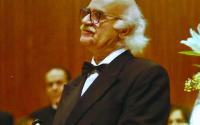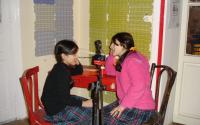By Kikuyo Komesu
TOKYO, May 4, Kyodo - Maurice Bejart, a giant in modern ballet who has won acclaim for his avant-garde choreography in works such as Stravinsky's ''The Rites of Spring'' and Ravel's ''Bolero,'' is leading dance into the 21st century. Bejart has won many international awards, including the Kyoto Award, and has been praised for raising ballet to the level of contemplation. The screening organization of the Japanese award said, ''Mr. Bejart made the dance performance an occasion for contemplation and the stage a space for thought. Deep in the heart of his approach is love, and his objective is to link people together across racial and ethnic barriers.'' A Marseilles native who converted to Islam and became a devotee of Sufism in 1973, Bejart talked about connecting the world from a religious and artistic point of view. ''I'm a little bit of a traveler,'' said the artist, who seems to easily transcend cultural and religious differences, in an interview with Kyodo News in Tokyo where he was on tour with Bejart Ballet Lausanne. The following are excerpts of Kyodo News' interview with Bejart in English. -- I understand you became a Muslim Sufi in 1973. Has anything changed in the way you see the Western world since your conversion? No. Because this is something very much inside. I think the problem of the world actually is that the religions lost what they are made for. The word religion means relationship, you know, and now the religions are fighting. It's stupid. Because if you are for one religion, you must be for every religion. It's not opposition, it's not difference. It's one way of thinking, one way of thinking but it's not (being an) enemy... Because religion is not made to make war. So if you mix up religion and war...it is that you are not religious people, really not. First, I get this spiritual master in Japan, Deshimaru-sensei, and then I found the religious master in Iran (Master Ostad Elahi) but they were saying the same thing. No difference, you know. So for me, religion is... a fact of unity, not a fact of war. (In the 1960s Bejart met with Taisen Deshimaru (1914-1982), a Zen monk of the Soto sect who propagated Zen Buddhism in Europe between 1967 and 1982. Bejart converted to Islam after meeting with Ostad Elahi (1895-1974), an Iranian Muslim leader, philosopher theologian, jurist and musician.) -- What has been the biggest influence of Islamic religion on you? I don't know because, for me, it doesn't make a difference being a Christian, Buddhist or Muslim. It doesn't make any difference. You see, at the end of the book, it's exactly the same. The important fact for my master was unity. Unity of things, unity of people, unity of religions, you know. So, this is to find the unity of self, but that you find in Zen. Because originally, it's one source. And people speak that language, that language and that language, but at the end it's the same meaning... For me, what's important is to find the unity of religions and not the difference. -- So what do you think of what's happening in the world now? Actually the world has made a great mistake, because they mix up all the values. And the economic side has become too strong and too powerful and destroyed everything else. So for the economy, we have destroyed...nature, we destroy the sea, we destroy the air, and then at the end we destroy the soul of humans. -- Are you saying a focus on economics has changed religions? Yes. We need the economy, but people think now the economy is God. Economy is God, you know. In the Indian theology, they think of a universal cycle -- going up and up and going down, down, down. The moment of going down, the Indians call it ''kari yuga,'' and now we are really in the middle of the kari yuga. But after we go down, it starts (to go up) again you know, life will be like this...and going down, down and when you are really down, maybe you're up. But we are not really (at the bottom), not yet... We have not hit the end of kari yuga, this very bottom world.... I don't know (how long this will last) but I think it's going to be worse. It can be only worse to go up again. It's like when you burn a forest, you really have to burn it (because) maybe the forest can live again after. -- How do you perceive the Sept. 11 attack on the United States? This is a part of a war started a long time ago. Well, I know that people may kill me if I say so. But the Americans have destroyed Hiroshima and then the English people have destroyed Dresden in Germany during World War II, and it's the continuation of the war. Why not in the States? Why not? Why not? They destroyed Hiroshima and why don't they get bombed in America? So, they know what it is at least. I don't think this is so exceptional. It's part of the war of a period. -- Do you think the terrorist attack of Sept. 11 changed the world in any way? For me, no. I don't see the difference between this and the war. I tell you, for me, it's like Hiroshima... They are sending bombs everywhere. It (the Sept. 11 attack) was the most spectacular...the plane coming there, you know...but basically it's the same fight between the people. It's stupid and basically the same process. But at the same time its the revolt from many countries because America is a state which wants to be the judge of the world. They want now to be the judge of the world. They say this is white, this is black and we have to live like Americans. But I think this is wrong. This attitude of America is wrong. -- What makes some people so intolerant and so exclusive? It comes from a long (cycle). Because, they give you a knock and another knock stronger and another knock stronger than another.... Just what's happening in Israel now. During the war, it had been a terrible catastrophe for the Jewish people. During the war they were very persecuted. It must have been something terrible... And now it starts again, because it's now them who are behaving like the Germans behaved in the war. So people are knocked and then they are knocking back. This can never end because they have been suffering but now they make other people suffer. So it can never be stopped. -- What can we do to avoid such a cycle of hatred? Well, what we can do is...for example, I don't like to speak much about me, but the ballet we do for Freddie Mercury (Ballet for Life), all the benefits I give to the AIDS Foundation. So with this ballet, I don't own money, I give it to the AIDS Foundation. It's a little bit, but you have to do what you can do, you know. ...We try to make one idea good, to make one person happy. What I do, I try to make one audience happy for two hours and a half. I try to give to my dancers a certain discipline of body and life, and I try to give what I can give to humanity. (Ballet for Life was inspired by and created as a tribute to Mercury, the vocalist of British rock group Queen who died of AIDS in 1991, and Jorge Donn, principal dancer and artistic director at Bejart's Ballet for the 20th Century in Brussels who died of AIDS in 1992. The ballet uses the music of Queen.) -- In Islamic countries, Islamic culture, they have a legacy and tradition in music, literature, and dance, but some fundamentalists deny all this. Why? Because they are wrong. Because they don't understand the religion and the culture. Because the fundamentalists are wrong. When you see what was the great empire of Baghdad... with beauty, with beauty of architecture, with beauty of women, with poetry. Now they have nothing to do with the great stuff. They are wrong. I think their practice is not really Islam. The practice of Islam (is) like the Catholics ... in the 16th century when there was a religious war. It was a great and awful time in Europe. For 100 years, they had a religious war, you know. They burned people, they killed people and now actually the Muslims have become a bit like that. -- Is it difficult to live in a mostly Christian country because you are a Muslim? Well, I'm a little bit of a traveler...Actually my (home) is in Lausanne, I'm very happy there. But I never thought I was born in France... and I never sought to belong to any country. If I work well with people, it is my country...Maybe it's a failure. I don't think it's good, but I don't feel (like) I belong to any country. -- So you don't think you belong to any particular culture, either? Yes, of course I've grown up with European culture and so maybe that sense I got from my father. Because my father was a teacher of philosophy and my father was a specialist in German philosophy and my father was speaking Chinese and writing Chinese. So maybe from my father, (I had) much influence, international influence. I remember when I was a child at home, I saw people come from the Orient and India. Lots of Indian people. So, for me, very soon I was from nowhere. -- Some of your works are based on Asian culture, like Kabuki, Bhakti, and so forth. What attracts you to Asia? Well, first of all, my father loved Asia. ...The first thing I remember in the room when my father was working, it was an empty space (with) a Buddha. And this Buddha of my father is now in my room in Lausanne. So, for me, it was not exotic. It was part of my childhood. So when I went to Asia, it was not to find an exotic country, but it's like finding my youth again. Even our family. My father was born in Senegal, my grandfather was born in Senegal and my great grandmother was Senegalese. Then the brother of my father was living in Vietnam, all his life. We were really a family open to the world. -- What do you think is the most important thing for understanding other cultures? If you think they are not other (but) ''their'' culture, they are not other cultures, (but) ''their'' culture. So, for me, there is no difference between Shakespeare, and Sei Shonagon, you know. It's no difference, two great writers. (Sei Shonagon is one of the best-known of the brilliant Japanese female writers of the Heian Period (794-1185). She is believed to have lived in the late 10th century and to have been the author of ''Makura no Soshi,'' or ''The Pillow Book.'') -- Do you feel most free in Western countries? You said you do not belong to any country. No. When I found people (who) want to work, or want to understand, want to live the way I live, I feel free in any country. I had a school in Dakar from the 1970s with African people, I lived a long time in Belgium, I lived in Sweden. To me there is no difference. If you basically can work in a nice way, no difference. -- I think your artistic work is to unite people, to go beyond the barriers. Yes. When I started my first company 40 years ago, we were an international company. I always had people from every country, from every race. My first Juliet was Japanese, Asakawa Hitomi. We had Brazilian people, we had the English people, we had the Germans, we had African people. So, for me, it was very natural to have a company international. Because, for me, all the countries have the same quality and same problems. I don't see one country as more important than the others. -- But not too many people think that way. I know. That's why people revolt against America, because they want to be the ruler of the world. The world belongs to many, many different countries with different hopes, different religions, with different ways of thinking and they have to be together, you know. It's not only the war. -- So how can we go beyond the difference, how can we pull people together? Each person has to make a little effort. Each person makes, in his own field, you in the newspapers, me in my dance... you make a little effort for the truth. Biographical Note: Maurice Bejart was born in Marseilles in southern France in 1927. His father was the philosopher Gaston Berger. He started lessons in ballet in 1941 when he was 14 and made his debut as a choreographer in 1945 in Marseilles. He achieved most of his formation as a dancer under Madame Egorova, Madame Rousanne and Leo Staats. He put his classical training into practice first in Vichy in 1946 and then with Janine Charrat, Roland Petit, and especially within the International Ballet in London. While touring Sweden with Ballet Cullberg in 1949, he discovered the power of choreographic expressionism and started doubling as a dancer and choreographer. In 1955, Bejart choreographed Pierre Henri's ''Symphony for a Lonely Man.'' Mastering his own techniques of expression, he established his reputation as a choreographer of global fame with his work in ''The Rite of Spring'' in 1959. He founded Ballet for the 20th Century in Brussels and added to his repertoire with ''The Rite of Spring'' and ''Bolero'' in 1961, Beethoven's ''Ninth Symphony'' in 1964, Mahler's ''Song of a Wayfarer'' in 1971, Toshiro Mayuzumi's ''The Kabuki'' in 1986 and Wagner's ''The Ring of the Nibelung'' in 1990. He moved his base to Lausanne in Switzerland in 1987 and founded Bejart Ballet Lausanne. Bejart is also the author of numerous books and director of stage plays, operas and films.






